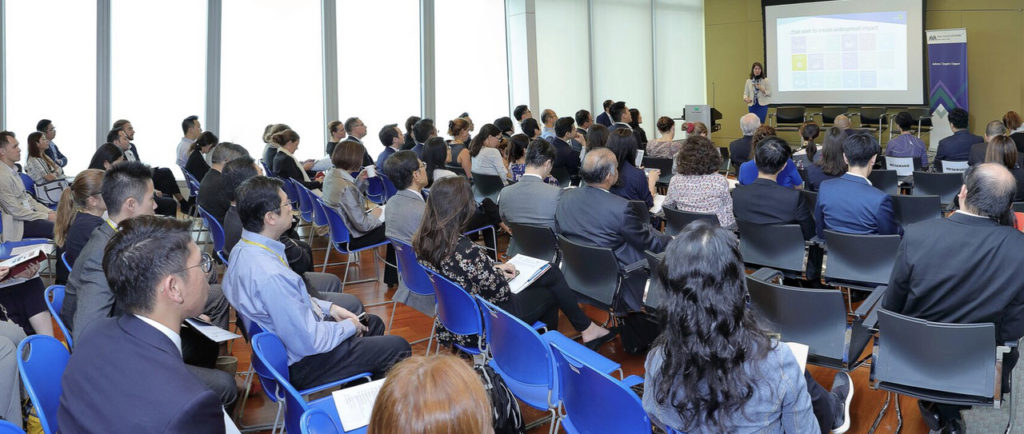This month, the Global Impact Investing Network (GIIN), Asia Value Advisors, and BNP Paribas Hong Kong, co-hosted the event, ‘Impact Investing in Asia: A Diverse and Dynamic Market’ at the BNP Paribas Hong Kong’s offices. The forum was convened as part of the GIIN’s Asia roadshow on the back of its recently-concluded global impact investing conference in Paris.

Rachel Bass sharing the GIIN’s presentation. Photo credit: BNP Paribas HK
This sold-out event attracted over a hundred participants consisting of local and overseas practitioners, academics and think tanks, mainstream and impact investors, government representatives, as well as intermediaries in the broader financial community.
Some take-aways include:
1. Growing diversity and number of players and strategies across the capital and impact continuum
Findings from the GIIN presentation showed that the impact investing ecosystem is increasingly diverse with a wide range of players including private investors, family offices, foundations, fund managers, insurance companies, pension funds, and development finance institutions. And each player, whether philanthropically-motivated or as an investor with an impact-lens, participate differently based on their risk appetites, impact goals, and returns expectations across the impact and capital spectrum. In recent years, these approaches and tools have begun to converge as more investments are increasingly framed with the United Nations Sustainable Development Goals (SDGs) as an additional lens to investment theses.
2. Building a breadth of track records to scale the impact investing ecosystem
To attract mainstream investors and funds to adopt impact management practices to investing, more pioneering impact investors are needed to build a breadth of track records that demonstrate how impact can be integrated into an investment framework. An example is through the work of impact investors such as The Osiris Group which seeks impact investment opportunities in the frontier markets where impact and returns are positively correlated as the business model scales. Another example in Hong Kong is the launch of the Sustainable Finance Initiative platform by the RS Group to convene more private investors to move from ideas to action in adopting an impact lens to investing.
Development finance institutions such as the IFC or government-linked funds (such as pension or exchange funds) have catalytic roles in influencing culture and mindset shifts of mainstream investors. In Japan, for instance, its Government Pension Investment Fund (GPIF) announced that it would invest $10 billion in two S&P Dow Jones stock indices that focus on carbon efficient companies demonstrating its strong support for ESG best practices.
3. Instilling a sense of urgency to take action

Katrina Ngo of GIIN, Annie Chen of RS Group, Jason Bajaj of the Osiris Group, Stephen Wong of Our Hong Kong Foundation. Photo credit: BNP Paribas HK
Annie Chen, Chair of RS Group, called for a ‘greater sense of urgency’ to embrace impact investing both as a tool and an approach to investing. She also shared her views from her panel session at the recent GIIN global conference in Paris noting the high quality of discussions on the various impact strategies. In contrast, Annie thinks Hong Kong has a huge opportunity to move more quickly beyond the ‘why’ of impact investing to taking action as it is in everyone’s self-interest in adopting an impact lens to investing.
4. Calling for cross-sector collaboration to unleash innovative funding and scale social impacts
Engaging stakeholders across different sectors helps to align incentives and build legitimacy in the field of impact investing. These include not only private investors, but also social enterprises, government, third-party organizations, and intermediaries.
Stephen Wong shared his insights on how government policy can help foster an enabling policy context to develop the impact investing ecosystem. He noted the growing momentum in Hong Kong via the government’s efforts through policies on ESG reporting guidelines and on green finance. For instance, in September 2018, Hong Kong’s Securities and Futures Commission (SFC) announced its strategic framework for the development of green finance in Hong Kong to consider policies on integrating ESG factors into the investment process.
5. Mainstreaming impact management practices
Initiatives such as the Impact Measurement Project (IMP) help foster commonality in the impact investing market by promoting best practices in impact management. This growing convergence is mainly on the impact management practices across asset classes rather than on specific impact metrics. In addition, the International Finance Corporation has recently published ‘Operating Principles for Impact Management’ which outlines key principles that integrate impact considerations throughout an investment life cycle. These principles seek to lower the barriers to entry as well as provide a guide to investors to align their incentives with other stakeholders when making investment decisions.
6. Building capacity and professionalizing the role of intermediaries
As the ecosystem matures, the role of and support for intermediaries and infrastructure platforms will need to grow in lock-step to unlock investment opportunities, facilitating collaborations, and bridging both talent and capital gaps across and within institutional silos.
We at Asia Value Advisors look forward to further ideas exchange which hopefully will catalyze collective action across sectors, institutions, and geographies towards a more sustainable future.
Special thanks to AVA volunteer consultant Heejin Choi for her contributions with this event, including providing some takeaways for this summary note.
Philo Alto is Founder and CEO of Asia Value Advisors.



Comments (0)